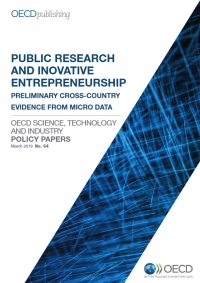OECD: Public research and innovative entrepreneurship: Preliminary cross-country evidence from micro data - March 2019 - eng (pdf)
This paper provides a first assessment of the degree to which public research contributes to innovative entrepreneurship, using data on start-ups and venture capital (VC). It looks at academic start-ups founded by recent undergraduates and doctorate students or researchers. It shows that academic start-ups represent 15% of all start-ups in the specific sample under scrutiny. Their share is higher in science-based technological fields such as biotechnology (23%). Across the majority of countries and technology fields, start-ups created by undergraduate students represent the highest share of all academic start-ups. As to their performance, start-ups founded by researchers are more likely to patent and those founded by students introduce innovations that are more radical compared to other start-ups. While start-ups founded by undergraduate students receive less VC funding and are less likely to exit via IPO or acquisition, those created by researchers are as successful as their non-academic counterparts.
Дополнительная информация
- Серия: Международные организации / OECD / Papers / Science, Technology and Industry Policy Papers
- Год: 2019
- Месяц: 3 (I кв)
- Источник: OECD


































